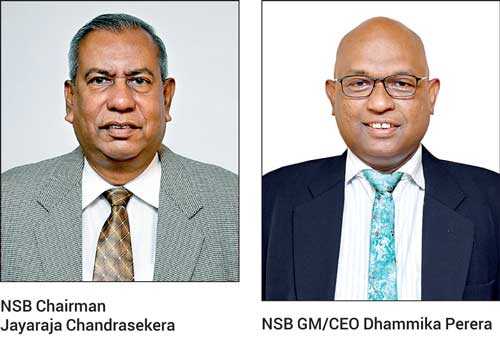Sunday Mar 01, 2026
Sunday Mar 01, 2026
Tuesday, 3 September 2019 00:41 - - {{hitsCtrl.values.hits}}
National Savings Bank demonstrated robust performance during the first half of 2019 amidst subdued macroeconomic and market conditions, and witnessed Profit Before Tax (PBT) of Rs. 4.3 billion, a growth of 15.5% compared to corresponding period of 2018.
The bank recorded a Profit After Tax (PAT) of Rs. 2.3 billion, an increase of 15.2% over the same period last year, despite the loss of With Holding Tax (WHT) on Government securities amounting to Rs. 1.3 billion during the first six months of 2019 over the same period 2018 due to removal of WHT benefit with effect from 1 April 2018. 
Additional tax of Rs. 832.7 million had a negative impact on the profit during 1H2019 compared to the same period last year resulted from the implementation of Debt Repayment Levy (DRL) which came in to effect 1 October 2018 onwards. The bank has contributed Rs. 4.8 billion to the Government in way of taxes and levies during the period under review.
Total income grew by 6.2% to Rs. 59.1 b whilst total operating income observed a growth of 15.3% to reach Rs. 15.1 billion. Net Interest Income (NII) which contributed to 90.9% to the total operating income grew by 10.9% to reach Rs. 13.8 billion over the same period last year. Net Interest Margin (NIM) improved to 2.61% during six months ended at June 2019 against 2.39% reported in the same period last year owing to growth in interest income outsets the growth of interest expenses.
Further, net fee income grew by 30.7% to Rs. 499.2 million benefitted from increase in business volumes. Net gain on trading amounted to Rs. 663.9 million during the period under review, growing significantly against the loss of Rs. 45.2 million reported in the same period last year.
Administrative and overhead expenses during the first six months of 2019 rose in line with the enhancement of business activities. Depreciation and amortisation on tangible and intangible assets increased by 65.8% due to investment made in branch network and digital infrastructure. However, the impairment charge for the six months ended 30 June 2019 was declined by 36.7% over the same period last year fuelled by redemption of Sri Lanka Development Bonds (SLDB) which was matured in 3Q2018. The resultant cost to income ratio improved to 51.3% for the period under review from 54.5% in 1H2018.
The total assets of the bank grew by 5.2% over 31 December 2018 to reach Rs. 1.1 trillion supported by growth in customer deposits. Customer deposits reached Rs. 907.8 billion, increased by 8.1% over the end of December 2018. Net loans and advances also rose by 5.7% to Rs. 447.8 billion against as at the end of December 2018. At the end of first half of 2019, the bank has managed to maintain the gross non-performing loan (NPL) ratio at 1.69% which is one of the lowest in the banking industry, demonstrating higher asset quality of the bank. The bank has successfully implemented and complied with the new accounting standard on leases - SLFRS 16 which came into effect from 1 January 2019. Thereby, a sum of Rs. 895.8 million of new asset was recognised and disclosed under “Right of used assets” in the financial position for the period ended 30 June 2019.
Complying with the Central Bank of Sri Lanka (CBSL)’s directions on capital requirements under Basel III, the Tier 1 and total capital adequacy ratios of the bank as of 30 June 2019 were 12.647% and 15.197% respectively, well above the statutory minimum requirements (10% and 14% respectively).
As another milestone in NSB’s journey, the bank has received the ‘Payment Card Industry Data Security Standard’ (PCI-DSS) certification, the cardholder data security standard accepted worldwide and became the first State Bank to achieve the PCI-DSS Certification.
The bank received the certificate of compliance for PCI-DSS Version 3.2.1 from Qualified Security Assessor (QSA), SISA. The PCI Security Standards Council (PCISSC), the governing body of PCI-DSS, is a global organization for promoting Payment Card Industry Standards for the safety of cardholder data across the globe.